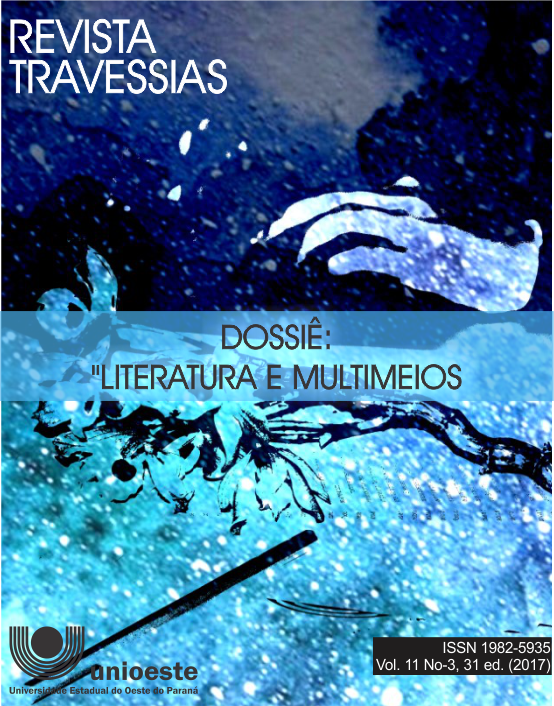Narrator Mirinho and the construction of Adeus in the work of Antônio Torres.
Keywords:
Narrator, Antonio Torres, Memory, Adeus, Velho.Abstract
In this article, we analyze some of the aspects of the work of Antônio Torres, Adeus, Velho, which was launched in 1981 and is in its 5th edition, we focused on its conception as narrative and on the role of the narrator and its importance for the construction of the plot of the work. Narrating the story of a family from the countryside of Bahia, which represents the sertanejo (inland person) in general, the author writes about the almost natural way of the young people towards the big cities and great capitals in order to seek the opportunity of a better life. Adeus, Velho is composed of a series of memories revived by the narrator, Mirinho, who has the authorship of the plot and narrates from a crucial moment for the history of the family and for the climax of the work: the imprisonment of his sister Virinha. In the light of theorists like Ligia Chiappini Moraes Leite ([ ] 2002[1885]), Walter Benjamim ([ ] 1995[1885]) and Loiva Otero Félix (1998), we explain about the forms of narration adopted by the author and how the narrator's memories construct history in a cyclical and timeless way, trying to understand its importance for the constitution of the narrative. Even so, we were able to understand how Antônio Torres' stylistic characteristics of writing are of paramount importance for the development of the plot and for the construction of the outcome sought by him.
Downloads
References
BAPTISTA, D. M. T. Nas terras do "Deus-dará": nordestinos e suas redes sociais em São Paulo. 1998. 328 f. Tese (Doutorado em Ciências Sociais) - Pontifícia Universidade Católica de São Paulo, São Paulo, 1998.
BENJAMIM, Walter. Obras Escolhidas vol. I: Magia e Técnica, Arte e Política. Tradução Sérgio Paulo Rouanet. 3. ed. São Paulo: [S. n.], 1995. p. 197 – 201.
BERGSON, Henri. Matéria e Memória: ensaio sobre a relação do corpo com o espírito. Tradução Paulo Neves. 2. ed. São Paulo: Martins Fontes, 1999.
COUTINHO, Eduardo F. Rompendo Barreiras: ensaios de literatura brasileira e hispano-americana. Rio de Janeiro: 7 Letras, 2014.
FÉLIX, Loiva Otero. História e Memória: a problemática da pesquisa. Ediupf: Passo Fundo, 1998.
FOSTER, Edward Morgan. Aspectos do romance. 2. ed. Porto Alegre: Globo, 1974.
GONÇALVES, Rogério Gustavo. O percurso da memória nos romances de Antônio Torres: a constituição do eu na fronteira entre o sertão e a cidade. 2014. 202 f. Tese (doutorado) - Universidade Estadual Paulista Julio de Mesquita Filho, Instituto de Biociências, Letras e Ciências Exatas, 2014. Disponível em: <http://hdl.handle.net/11449/122249>acesso em 26 de maio de 2017.
HALBWACHS, Maurice. A memória coletiva. (tradução Beatriz Sidou) São Paulo: Centauro, 2006.
LEITE, Ligia Chiappini Moraes. O foco narrativo (ou a polêmica em torno da ilusão). 10ª ed. São Paulo: Editora Ática, 2002.
SAID, Edward W. Representações do intelectual: as conferências de Reith de 1993; Tradução Milton Hatoum. São Paulo: [S. n.], 2005.
TORRES, Antônio. Adeus, Velho. São Paulo: Ática, 1981.
Downloads
Published
How to Cite
Issue
Section
License
Creative Copyright Notice
Policy for Free Access Journals
Authors who publish in this journal agree to the following terms:
1. Authors keep the copyright and grant the journal the right of first publication, with the work simultaneously licensed under the Creative Commons Attribution License, which allows sharing the trial with acknowledgment of authorship and initial publication in this journal.
2. Authors are authorized to take additional contracts separately, for non-exclusive distribution of the work version, published in this journal (eg publish in institutional repository or as a book chapter), with acknowledgment of authorship and initial publication in this journal.
3. Authors are allowed and encouraged to publish and distribute their work online (eg in institutional repositories or on their personal page) at any point before or during the editorial process, as this can generate productive changes, as well as increase both impact and citation of the published trial (See The Effect of Free Access).
Creative Commons License
This work is licensed under a Creative Commons Attribution–NonCommercial-shareaswell 4.0 International License, which allows you to share, copy, distribute, display, reproduce, completely or part of the work, since there is no commercial purpose, and authors and source are cited.



